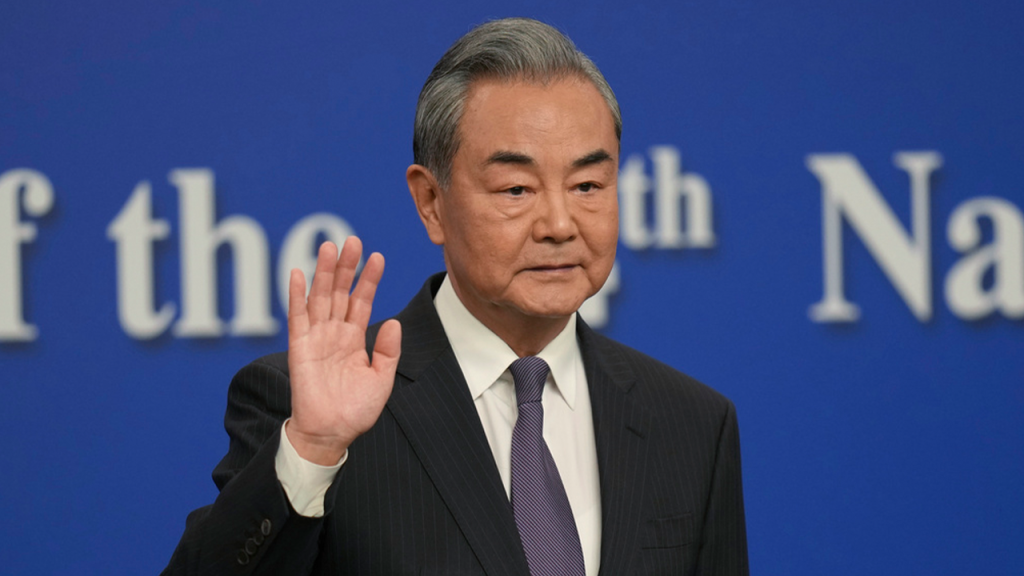During a recent press conference, Chinese Foreign Minister Wang Yi criticized the United States for imposing new tariffs, accusing it of using “arbitrary” measures in response to alleged fentanyl smuggling from China. Wang expressed his intent to retaliate against the U.S. for these actions, labeling them as unjustified and detrimental to bilateral relations. This event took place against the backdrop of escalating trade tensions and increasing tariffs imposed by both countries, particularly following President Donald Trump‘s reinstatement to office in January, which has intensified the ongoing trade war.
| Article Subheadings |
|---|
| 1) Context of Increased Tariffs |
| 2) Reactions from China |
| 3) Implications for U.S.-China Relations |
| 4) International Reactions to Trade Policies |
| 5) Future Outlook on Trade Relations |
Context of Increased Tariffs
The recent escalation of tariffs reflects a complex backdrop of geopolitical tensions and economic competition between the U.S. and China. The U.S. government’s imposition of significant tariffs was partially predicated on claims that China was facilitating the flow of industrial chemicals used to produce fentanyl, a potent synthetic opioid that has contributed to a public health crisis in the United States. President Donald Trump stated that these tariffs, raised to 20% on all Chinese imports, are necessary to protect American interests and to combat the fentanyl crisis directly. This bold move can be seen both as a strategy to exert pressure on China and as a reaction to domestic political pressures regarding drug trafficking and opioid addiction, issues that plague many communities in the U.S.
Reactions from China
In response to the U.S. tariffs, Wang Yi firmly defended China’s record on narcotics control and accused the U.S. of employing “flimsy excuses” to justify economic aggression against China. During his press briefing, Wang highlighted the strides China has made to curb the export of chemicals associated with the manufacture of fentanyl, arguing that tariffs based on these allegations are misplaced and unfounded. He maintained that China’s efforts to tackle the fentanyl issue should be acknowledged rather than met with punitive measures. Furthermore, the Chinese Foreign Ministry has warned that intimidation tactics will not deter China from defending its interests and that retaliatory measures will inevitably follow if the tariffs continue.
Implications for U.S.-China Relations
The ongoing tariff dispute signals a deterioration in what was already a strained relationship between the U.S. and China. Wang’s comments during the press conference underscored the difficulty of simultaneously suppressing China’s influence while attempting to cultivate a positive diplomatic relationship. “Such two-faced acts are not conducive to the bilateral relationship’s stability or to rebuilding mutual trust,” Wang stated. The long-term repercussions of these tariffs may extend beyond economics, impacting areas such as collaboration on global issues, regional security dynamics, and broader bilateral engagements. The history of trade talks has shown that mutual concessions and understanding are often necessary for progress; however, current tensions suggest that these may be harder to achieve amid increasing hostility.
International Reactions to Trade Policies
The retaliatory tariffs have generated mixed reactions globally, with many countries closely observing the U.S.-China standoff. Some analysts argue that this trade war may create opportunities for other nations as U.S. companies look to source products from countries outside of China. Ministry spokesperson Lin Jian‘s remarks about the negative impact of bullying on international norms resonate with growing concerns regarding the rise of protectionism. Nations within the Global South and other international partners are particularly wary of how these escalating tensions might impact trade dynamics and economic stability in their own territories.
Future Outlook on Trade Relations
Looking ahead, the outlook on U.S.-China trade relations remains uncertain, with both sides appearing entrenched in their positions. The trade conflict could escalate further if retaliatory measures continue. Experts suggest that for any resolution to occur, both parties will need to engage sincerely in dialogue and recognize the importance of compromise. While tariffs may serve a political purpose, they could undermine the potential for long-term economic growth and collaboration in addressing major global challenges, including climate change and public health crises.
| No. | Key Points |
|---|---|
| 1 | Chinese Foreign Minister Wang Yi criticized the U.S. for its new tariffs during a press conference. |
| 2 | The tariffs were enacted in response to alleged fentanyl smuggling from China. |
| 3 | China insists it has made significant efforts to combat the fentanyl crisis. |
| 4 | The ongoing trade tensions could negatively impact global economic stability. |
| 5 | Experts call for dialogue and compromise for potential resolution of the trade war. |
Summary
The confrontation between the U.S. and China over tariffs exemplifies the broader challenges faced in international trade relations today. The assertions made by Wang Yi highlight the tensions arising from economic protectionism and the implications for diplomatic engagements. As both nations grapple with complex issues that intersect economic and political realms, the path forward may require an earnest commitment to dialogue and negotiation to alleviate tensions and foster a more stable global trade environment.
Frequently Asked Questions
Question: What prompted the new round of tariffs imposed by the U.S.?
The new tariffs were imposed in response to accusations of fentanyl smuggling associated with China, aiming to mitigate the ongoing opioid crisis in the United States.
Question: How has China responded to the U.S. tariffs?
China’s response includes accusations that the U.S. is using unjustified claims as a pretext for economic aggression while expressing intentions to retaliate against the tariffs.
Question: What are the broader implications of the U.S.-China trade conflict?
The trade conflict can affect global economic stability, alter trade dynamics among other nations, and hinder international cooperation on pressing global issues.


